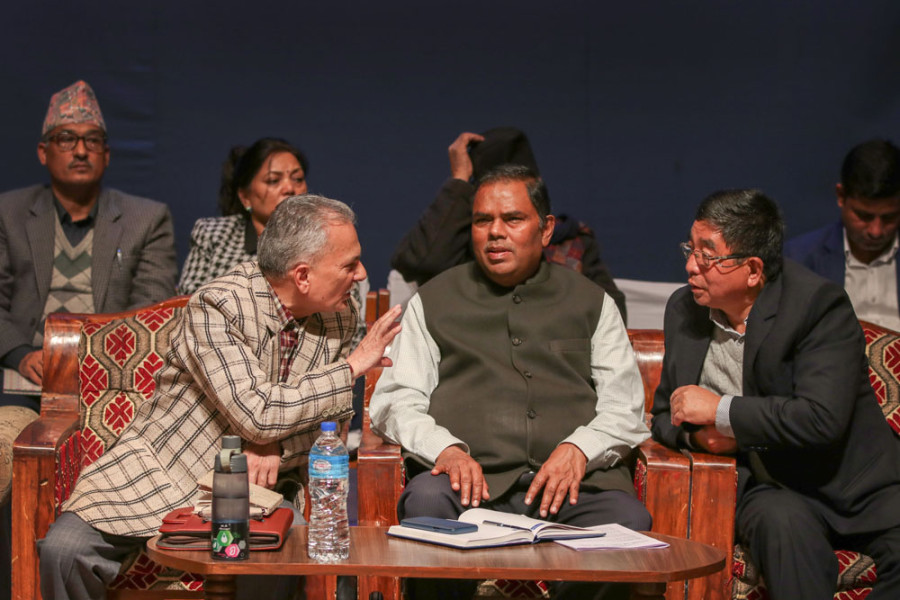Politics
Samajbadi Party exits government to little effect on the Oli administration
National politics will remain relatively unaffected, but there could be repercussions in Province 2, analysts say.
Tika R Pradhan
Days after the Rastriya Janata Party Nepal reached a deal with the ruling Nepal Communist Party on an electoral alliance for the National Assembly elections, more political drama has unfolded in Kathmandu, and the reverberations could reach Province 2.
On Tuesday, the Samajbadi Party quit the government.
Deputy Prime Minister and Minister for Law Upendra Yadav and Minister for Urban Development Mohammad Istiyak Rai tendered their resignations to Prime Minister KP Sharma Oli on Tuesday.
The decision comes a day after Oli rejected Yadav’s proposal on constitutional amendments.
“By rejecting the proposal of an expert team, [Prime Minister] stepped back from the two-point agreement. As it is clear that the pact was violated unilaterally, I have tendered my resignation as I do not find it appropriate to remain in the government on moral grounds,” reads Yadav's resignation letter.
The Samajbadi Party Nepal, then known as the Sanghiya Samajbadi Forum-Nepal, had joined the Oli government on May 28 last year after signing a two-point agreement on constitutional amendments.
Oli's flat rejection of the proposal may have been the trigger for the pullout from the government but relations between Oli and Yadav had soured over the months. Yadav was critical of the Oli government of which his party was part. Oli’s move of changing Yadav’s portfolio during the Cabinet reshuffle last month from health to law ministry without consulting the party was also called "unceremonious" by some party members.
Analysts say the alliance between the Rastriya Janata Party and the Nepal Communist Party (NCP) for the National Assembly polls, however, was the beginning of the end of Yadav’s tenure in government.
Samajbadi Party and Janata Party are two Madhes-based forces in the federal Parliament with 17 and 16 seats, respectively. Janata Party’s Resham Chaudhary remains suspended as a lawmaker since his conviction in March.
The Janata Party withdrew its support to the government in March after a district court handed a life sentence to lawmaker Chaudhary for masterminding the deadly Tikapur violence in August 2015, in which nine people, including a toddler, were killed.
Janata Party since had been asking Samajbadi Party, which was formed in May 5 after the merger of Yadav’s Sanghiya Samajbadi Forum and Baburam Bhattarai’s Naya Shakti Party, to quit the government and form a united force to put pressure on the government to amend the constitution.
Yadav, despite pressure from within the party, however, was reluctant to quit hte government.
With Samajbadi Party's exit, there are now speculations about the Janata Party joining hte government, which could strain ties between the two Madhes-based parties that lead a coalition government in Province 2.
If the Samajbadi Party and the Janata Party fail to maintain their alliance in Province 2, Oli’s Nepal Communist Party, which leads governments in all other provinces, could make inroads into the region.
Rastriya Janata Party leaders said that the party could join the government only if 'false cases' against their party leaders and cadres are withdrawn and Chaudhary is released. The Oli administration must also present a constitutional amendment bill.
“If our demands are met, we will join the government. But I don’t think the Oli administration is willing to comply,” said Keshav Jha, general secretary of the Rastriya Janata Party Nepal.
Yadav’s resignation could also mean Deputy Speaker Shiva Maya Tumbahangphe’s entry into the law ministry, which paves the way for Oli to install the leader of his choice, most probably Subas Nembang, as the House Speaker.
Tumbahangphe, however, has maintained that she won’t resign from the post of Deputy Speaker and she has laid claim to the post of Speaker.
If Oli is able to convince Tumbahangphe to resign for a ministerial berth, leaders say he could offer the Janata Party the post of Deputy Speaker and at least one other ministry.
According to analysts, these political happenings will not make much difference in the federal government, as the Nepal Communist Party still enjoys a comfortable majority.
Janata Party’s joining the government will only be symbolic in the sense that it will embolden Oli, they say.
According to CK Lal, a political commentator who is also a columnist for the Post, a movement for constitutional amendments is nowhere close, regardless of the claims by either the Samajbadi Party or the Janata Party.
“Even the weather will not allow protest movement on the streets,” said Lal.
Since this government’s mandate from the people was against amendments to the constitution, the ruling party cannot go against its constituency either, he said.
As far as Yadav’s resignation is concerned, according to Lal, he had outlasted his utility and his position in government had already become untenable.
"Yadav was sticking to the government despite facing humiliation from Oli, as he had no other option,” Lal told the Post. "Yadav's exit, however, could affect the Province 2 government."
But Lal believes that it might not be so easy for the Janata Party to join government either as there are differences within the party. The Oli government doesn't really need them either, said Lal.




 17.12°C Kathmandu
17.12°C Kathmandu















